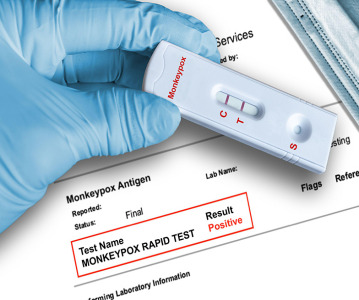NIH-Led Effort Launches Big Data Portal for Alzheimer’s Drug Discovery

A National Institutes of Health-led public-private partnership to transform and accelerate drug development has achieved a significant milestone with the launch of a new Alzheimer’s Big Data portal — including delivery of the first wave of data — for use by the research community. The new data sharing and analysis resource is part of the Accelerating Medicines Partnership (AMP), an unprecedented venture bringing together NIH, FDA, industry and academic scientists from a variety of disciplines to translate knowledge faster and more successfully into new therapies.
The opening of the AMP-AD Knowledge Portal External Web Site Policy and release of the first wave of data will enable sharing and analyses of large and complex biomedical datasets. Researchers believe this approach will ramp up the development of predictive models of Alzheimer’s disease and enable the selection of novel targets that drive the changes in molecular networks leading to the clinical signs and symptoms of the disease.
“We are determined to reduce the cost and time it takes to discover viable therapeutic targets and bring new diagnostics and effective therapies to people with Alzheimer’s. That demands a new way of doing business,” said NIH Director Francis S. Collins. “The AD initiative of AMP is one way we can revolutionize Alzheimer’s research and drug development by applying the principles of open science to the use and analysis of large and complex human data sets.”
Developed by Sage Bionetworks External Web Site Policy, a Seattle-based non-profit organization promoting open science, the portal will house several waves of Big Data to be generated over the 5 years of the AMP-AD Target Discovery and Preclinical Validation Project by multidisciplinary academic groups. The academic teams, in collaboration with Sage Bionetworks data scientists and industry bioinformatics and drug discovery experts, will work collectively to apply cutting-edge analytical approaches to integrate molecular and clinical data from over 2000 postmortem brain samples.
The National Institute on Aging (NIA) at NIH supports and coordinates the multidisciplinary groups contributing data to the portal. The AMP Steering Committee for the Alzheimer’s Disease Project is composed of NIA and the National Institute of Neurological Disorders and Stroke, both of NIH, the FDA, four pharmaceutical companies (AbbVie, Biogen Idec, GlaxoSmithKline and Lilly) and four non-profit groups (Alzheimer’s Association, Alzheimer’s Drug Discovery Foundation, Geoffrey Beene Foundation and USAgainst Alzheimer’s) and is managed through the Foundation for the NIH.
“The enormous complexity of the human brain and the processes involved in development and progression of Alzheimer’s disease have been major barriers to drug development,” said NIA Director Richard J. Hodes. “Now that we are gathering the data and developing the tools needed to tackle this complexity, it is key to make them widely accessible to the research community so we can speed up the development of critically needed therapies.”
Because no publication embargo is imposed on the use of the data once they are posted to the AMP-AD Knowledge Portal, it increases the transparency, reproducibility and translatability of basic research discoveries, according to Suzana Petanceska, NIA’s programme director leading the AMP-AD Target Discovery Project.
“The era of Big Data and open science can be a game-changer in our ability to choose therapeutic targets for Alzheimer’s that may lead to effective therapies tailored to diverse patients,” Petanceska said. “Simply stated, we can work more effectively together than separately.”
Related News
-
News CPHI Frankfurt 2022: Innovator Interview – DSM Biomedical
At CPHI Frankfurt we spoke to Anne-Cecile Bayne, Global Science & Innovation Lead Pharma and Medical Nutrition, and Marc Hendriks, Vice President Strategy & Business Development, on their expertise in nitrosamines and business strategy at DSM Biomedica... -
News New WHO health emergency guidelines expect full transparency from Big Pharma
The WHO are proposing a new set of pandemic guidelines to set out how future global health crises should be handled. -
News Magic mushrooms could be used to treat mental health conditions
A compound found in magic mushrooms, psilocybin, could be used to treat mental health conditions and help patients suffering with severe depression, as shown by the results of the largest study of its kind to date. -
News UK-based partnership to launch DETERMINE study into rare cancer research
UK-based CRO Quanticate is set to partner with Cancer Research UK for the launch of the DETERMINE study focused on testing a range of existing and approved drugs and therapies on rare cancers. -
News FDA approves Thermo Fisher blood tests for wheat and sesame allergies
Both tests have been approved by the US regulator for in vitro diagnostic use -
News QIAGEN launches world’s first syndromic test for monkeypox
The test can distinguish between monkeypox and other diseases that cause similar symptoms. -
News Monkeypox Update: Vaccine shortage, sewage surveillance and global testing
As concern over the monkeypox outbreak continues to rise, we take a look at major developments from the first week of August. -
News CPHI Podcast Series: The importance of novel excipients for innovative drug development
The latest episode in the CPHI Podcast Series dives into the world of novel excipients and explores their importance for innovative drug development.
Position your company at the heart of the global Pharma industry with a CPHI Online membership
-
Your products and solutions visible to thousands of visitors within the largest Pharma marketplace
-
Generate high-quality, engaged leads for your business, all year round
-
Promote your business as the industry’s thought-leader by hosting your reports, brochures and videos within your profile
-
Your company’s profile boosted at all participating CPHI events
-
An easy-to-use platform with a detailed dashboard showing your leads and performance


.png)




